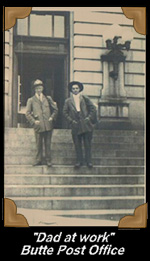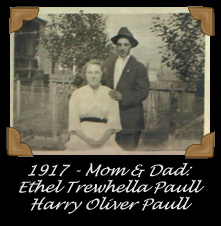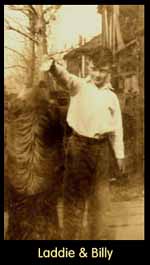









 I have a faint memory of that old privy. It wasn't a separate little shed but was built into a big old barn on
the back of the lot and located next to the coal bin. Everyone was expected to return from the outhouse with
a bucket of coal. It was a system that worked very well.
I have a faint memory of that old privy. It wasn't a separate little shed but was built into a big old barn on
the back of the lot and located next to the coal bin. Everyone was expected to return from the outhouse with
a bucket of coal. It was a system that worked very well. Dad was a tinkerer. I remember the excitement in our house when the radio finally worked. He had taken a correspondence course in 'Electricity and Radio', bought a kit and assembled a radio receiver. To my
mother's dismay, since radio reception was better after dark, --he'd sit up all night, twirl the dials, and holler
in excitement when he'd get a garbled transmission all the way from Minnesota! He strung aerial wires
around the eaves of the house and even plugged into the metal clothes lines. Neighbors came each evening
and stood outside our kitchen window listening to this new marvel. Dad would set the fan-shaped speaker in
a big wash tub to amplify the volume. It did magnify the sound but it didn't do much for tonal quality. As I
recall, it was a real triumph to understand an occasional word or sentence, and music wasn't much better;
everything sounded scratchy and nasal but Yes, We Have No Bananas could be recognized over the
static.
Dad was a tinkerer. I remember the excitement in our house when the radio finally worked. He had taken a correspondence course in 'Electricity and Radio', bought a kit and assembled a radio receiver. To my
mother's dismay, since radio reception was better after dark, --he'd sit up all night, twirl the dials, and holler
in excitement when he'd get a garbled transmission all the way from Minnesota! He strung aerial wires
around the eaves of the house and even plugged into the metal clothes lines. Neighbors came each evening
and stood outside our kitchen window listening to this new marvel. Dad would set the fan-shaped speaker in
a big wash tub to amplify the volume. It did magnify the sound but it didn't do much for tonal quality. As I
recall, it was a real triumph to understand an occasional word or sentence, and music wasn't much better;
everything sounded scratchy and nasal but Yes, We Have No Bananas could be recognized over the
static.



| Memoirs Title Page | Tipi's Retreat |

Copyright 1996 by /\/\ / ( /-/ = // =